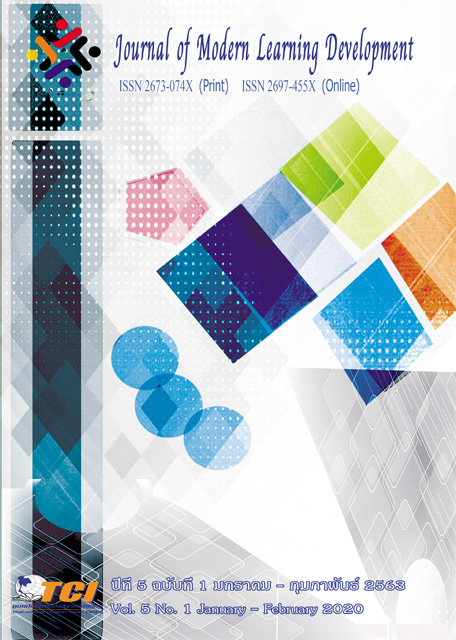Learning Management on the Social Studies Subject to Develop Students Voluntray Spiritphrapariyattidhamma Schools Ganeral Education Lower Secondary Students in Ubon Ratchathani Province
Main Article Content
Abstract
The aims of this research were: to study the conditions of learning management; to compare factors affecting the samples’ opinions; to propose the guidelines for the learning management of social studies for volunteer spirit development of lower secondary school students in the Phrapariyatti-dhamma schools, general education department, Ubon Ratchathani province. This study was a mixed methods research, which consisted of quantitative research and qualitative research. The research tools included questionnaires and interview forms. The samples were 132 lower secondary school students. The statistics used in the data analysis forms were: Frequency, Percentage, Mean and Standard Deviation, f-test and Scheffe’s Pair Comparison.
The research results were as follows: The students opinions towards the learning management of social studies for volunteer spirit development of lower secondary school students in the Phrapariyatti-dhamma schools, general education department in overall picture was in a high level (x̄ = 4.13), when considering in each aspect, the highest was seen in that of unity (x̄ = 4.19), followed by kindness (x̄ = 4.17), sacrifice (x̄ = 4.15), responsibility (x̄ = 4.15) and teamwork (x̄ = 4.10) respectively.
The comparative analysis results of the learning management of social studies for volunteer spirit development of lower secondary school students in the Phrapariyatti-dhamma schools, general education department, classified by educational level showed indifferent significance at the level of .05, which was not according to the hypothesis set, however, classified by school size, the statistically significant difference was seen at the level of .05, in accordance with the set hypothesis.
The guidelines for the learning management of social studies for volunteer spirit development of lower secondary school students in the Phrapariyatti-dhamma schools, general education department are that the students should have volunteer spirit to work for others without hoping for compensation, with generosity, caring for those around regularly, always helping those who have suffered, to provide cooperation, to join hands together to perform activities with unity, showing respect and following the rules and regulations of the school strictly; teachers should have guidelines to promote and support volunteer activities to clearly develop students according to the objectives set.
Article Details
References
ณัฏฐ์ชุดา สุภาพจน. (2561). จิตอาสาของนักศึกษามหาวิทยาลัยราชภัฏในเขต กรุงเทพมหานคร. วารสารบัณฑิตวิทยาลัยมหาวิทยาลัยราชภัฏจันทรเกษม, 13 (1), 78-88)
บุญชม ศรีสะอาด. (2556). วิธีการทางสถิติสำหรับการวิจัย. (พิมพ์ครั้งที่ 5).กรุงเทพมหานคร : สุวีริยาสาส์น.
พระกรวัฒน์ สิริปญฺโญ (สืบสวน). (2562). การจัดการเรียนรู้เพื่อพัฒนาผู้เรียนด้านจิตอาสา กลุ่มสาระการเรียนรู้สังคมศึกษา ศาสนา และวัฒนธรรม ระดับมัธยมศึกษาตอนปลาย สังกัดสำนักงานเขตพื้นที่การศึกษามัธยมศึกษา เขต 25. วารสารบัณฑิตศึกษามหาจุฬาขอนแก่น, 6 (4), 177-191.
พิสชา สถาพรบำรุงเผ่า. (2560). แนวทางการพัฒนาปัจจัยที่ส่งผลต่อจิตอาสาของนักเรียนสถาบันการอาชีวศึกษาในภาคตะวันวันออกเฉียงเหนือ 5. วารสารชุมชนวิจัย, 11 (3), 110-125.
เมธินี วงศ์วานิช รัมภกาภรณ์. (2558). การจัดการเรียนการสอนตามแนวคิดจิตตปัญญาศึกษา: การสังเคราะห์งานวิจัย. วารสารวิชาการมหาวิทยาลัยอีสเทิร์นเอเชีย ฉบับสังคมศาสตร์และมนุษยศาสตร์, 5 (2), 328-342.
วลัยรัตน์ ยิ่งดำนุ่น. (2555). การศึกษาผลสัมฤทธิ์ของโครงการจิตอาสา: กรณีศึกษานักเรียนชั้นมัธยมศึกษาตอนปลาย ของโรงเรียนบางมดวิทยา สีสุกหวาดจวนอุปถัมภ์. พุทธศาสตรมหาบัณฑิต สาขาวิชาการบริหารการศึกษา. บัณฑิตวิทยาลัย : มหาวิทยาลัยมหาจุฬาลงกรณราชวิทยาลัย.
สมปอง ช่วยพรม. (2559). การพัฒนารปแบบกิจกรรมเสริมสร้างจิตสาธารณะ ตามหลักการเรียนรู้แบบรับใช้สังคม สําหรับนักเรียนระดับประถมศึกษา. วารสารมหาวิทยาลัยราชภัฏลําปาง, 5 (2), 133-146
สัญญา สาผลิผลิน. (2561). การพัฒนารูปแบบการจัดกิจกรรมเพื่อเสริมสร้างคุณลักษณะจิตสาธารณะของนักเรียนระดับชั้นประถมศึกษาในสถานศึกษาขั้นพื้นฐาน.วารสารวิชาการสถาบันเทคโนโลยีแห่งสุวรรณภูมิ, 4 (2), 1-15.


